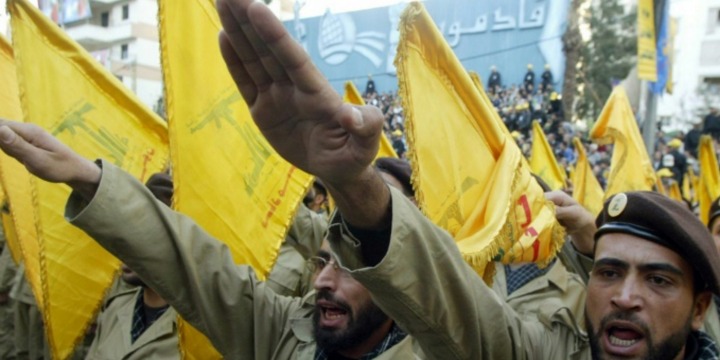Iran and Hezbollah Prioritize Terrorism Funding Over Societal Development
 by Steven Emerson
by Steven Emerson
Despite growing unrest and a weakening economy, Iran continues to funnel massive amounts of money and resources to its main terrorist proxies, especially Hezbollah, in order to expand its reach.
Iranian President Hassan Rouhani’s recent budget allocates far more funds to regime-controlled religious charities and regional terrorist activities than to domestic social and economic programs, according to an analysis published on Sunday in Al-Arabiya.
Rouhani’s government claims to be focused on reducing poverty and improving employment opportunities, yet it continues to cut subsidies on basic commodities and financial transfers to poor families amid rising fuel and food prices.
Instead of supporting its own people, Iran is devoting $7.4 billion to the military — primarily toward its ballistic missile program and the Revolutionary Guard Corps (IRGC)’s regional expansion.
Iran has also flat out rejected any efforts to renegotiate the nuclear agreement with Western powers amid reports of European efforts last month to constrain Iran’s regional expansion and ballistic missile program.
The Lebanese terrorist organization Hezbollah is a major beneficiary of the latest budget. Iran “is believed by some analysts to fund [Hezbollah] to the tune of $300 million a year, although many now believe the sum is more like $1 billion,” writes Tony Duheaume.
Combined with its international criminal enterprises and drug-smuggling network, Hezbollah has no shortage of resources to continue consolidating operating bases to target Israel.
Hezbollah’s involvement in the international drug trade is well documented.
It cultivates a major base of operations in the Tri-Border Area (TBA) straddling Brazil, Argentina, and Paraguay. With a large Muslim population including significant numbers of Hezbollah sympathizers, the terrorist organization uses this area for recruitment, arms smuggling, drug trafficking, and logistics planning for terrorist operations.
The TBA remains “an important regional nexus of arms, narcotics, pirated goods, human smuggling, counterfeiting, and money laundering — all potential funding sources for terrorist organizations,” the US State Department has said.
A significant portion of the profits earned from Hezbollah’s illegal activities is laundered via car sales to Africa, in addition to used car dealerships in the United States.
With Iran’s help, Hezbollah has evolved from a clandestine terrorist group into a full-fledged guerrilla organization that is now one of the most powerful terrorist armies in the Arab world. Iran continues to equip Hezbollah with the latest sophisticated and advanced weaponry, which poses a direct threat to Israel’s national security.
Beyond military and terrorist capabilities, Hezbollah enhances its propaganda infrastructure worldwide, publishing its own newspapers, magazines, and books that promote the Islamic Republic’s ideology. Iran helps cover the $15 million per year required to sustain Hezbollah’s Al Manar satellite television network, which is intended to broaden its ideological reach to Shia communities worldwide.
Hezbollah’s devotion to Iran’s revolutionary ideology takes precedence over Lebanon’s constitution, Hezbollah Secretary General Hassan Nasrallah said in a March 10 speech delivered to Iranians in Lebanon. Hezbollah also adheres to Ayatollah Khamenei’s orders, Nasrallah added.
While Hezbollah claims to be Lebanon’s protector and vanguard, Nasrallah’s speech reaffirms Hezbollah’s primary commitment to carrying out Iran’s directives, even at the expense of Lebanese domestic interests.
Steven Emerson is considered one of the leading authorities on Islamic extremist networks, financing, and operations. He serves as the Executive Director of The Investigative Project on Terrorism, a non-profit organization that serves one of the world’s largest storehouses of archival data and intelligence on Islamic and Middle Eastern terrorist groups.
 Iran Sentences Rapper Toomaj Salehi to Death Over 2022-23 Unrest
Iran Sentences Rapper Toomaj Salehi to Death Over 2022-23 Unrest Netanyahu: ‘Antisemitic Mobs Have Taken Over Leading U.S. Universities’
Netanyahu: ‘Antisemitic Mobs Have Taken Over Leading U.S. Universities’ U.S. Decides Against Sanctions on IDF’s Netzah Yehuda Battalion
U.S. Decides Against Sanctions on IDF’s Netzah Yehuda Battalion Israel Says It Is Poised to Move on Rafah
Israel Says It Is Poised to Move on Rafah Israeli Hostage Hersh Goldberg-Polin Seen Alive in a New Hamas Video
Israeli Hostage Hersh Goldberg-Polin Seen Alive in a New Hamas Video Palestinian Prime Minister Announces New Reform Package
Palestinian Prime Minister Announces New Reform Package France: Man Suspected of Abducting, Raping Jewish Woman ‘to Avenge Palestine’
France: Man Suspected of Abducting, Raping Jewish Woman ‘to Avenge Palestine’ Israel Intensifies Strikes Across Gaza, Orders New Evacuations in North
Israel Intensifies Strikes Across Gaza, Orders New Evacuations in North Iran Threatens to Annihilate Israel Should It Launch a Major Attack
Iran Threatens to Annihilate Israel Should It Launch a Major Attack ‘Completely Baseless’: Reports of Mass Graves at Gaza Hospitals are False, IDF Says
‘Completely Baseless’: Reports of Mass Graves at Gaza Hospitals are False, IDF Says




 U.S. Decides Against Sanctions on IDF’s Netzah Yehuda Battalion
U.S. Decides Against Sanctions on IDF’s Netzah Yehuda Battalion Israeli Hostage Hersh Goldberg-Polin Seen Alive in a New Hamas Video
Israeli Hostage Hersh Goldberg-Polin Seen Alive in a New Hamas Video Iran Sentences Rapper Toomaj Salehi to Death Over 2022-23 Unrest
Iran Sentences Rapper Toomaj Salehi to Death Over 2022-23 Unrest Netanyahu: ‘Antisemitic Mobs Have Taken Over Leading U.S. Universities’
Netanyahu: ‘Antisemitic Mobs Have Taken Over Leading U.S. Universities’ Israel Says It Is Poised to Move on Rafah
Israel Says It Is Poised to Move on Rafah